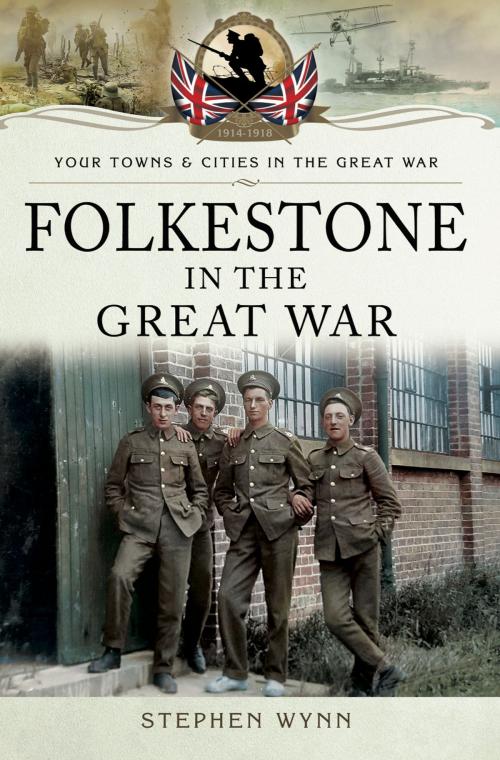| Author: | Stephen Wynn | ISBN: | 9781473865020 |
| Publisher: | Pen and Sword | Publication: | March 30, 2017 |
| Imprint: | Pen and Sword Military | Language: | English |
| Author: | Stephen Wynn |
| ISBN: | 9781473865020 |
| Publisher: | Pen and Sword |
| Publication: | March 30, 2017 |
| Imprint: | Pen and Sword Military |
| Language: | English |
Folkestone became one of the most important British towns during the First World War. Through its harbor, an estimated 10 million troops and nurses either departed from or arrived back in England between 1914 and 1919. For those leaving it was, for the most part, to fight on the battlefields of the Western Front. For those returning, it was either because they had been wounded or that they were coming home for some well-earned leave. Because of its geographical location along the south coast, the town was always going to be heavily involved in the course of the war. Shorncliffe camp saw the arrival of Canadian soldiers, infantry who had come to practice in its purpose-built trenches, and cavalry units who put their horses through their paces on its open grounds. As well as this, there was an influx of Belgian refugees who arrived in the town, having escaped the tyranny of an advancing Germany Army. Most stayed for the duration of the war, enjoying the hospitality and friendship of local people who had taken them in with open arms. With the town being a hive of military activity, the people of Folkestone went about their business as best they could. For many this included worrying about the well-being of a loved one who had gone off to fight in the war, hoping that they would remain safe but not knowing if they would ever see them again. It wasn't just on the Western Front, however, that death reared its ugly head. On one occasion it happened in Folkestone, in what has become known as the Tontines Street Air Raid. Seventy-one men, women and children were killed and another ninety-four were injured this German air raid, which took place on 25 May 1917. This book is a poignant testimony to those people as well as the men who didn't make it back
Folkestone became one of the most important British towns during the First World War. Through its harbor, an estimated 10 million troops and nurses either departed from or arrived back in England between 1914 and 1919. For those leaving it was, for the most part, to fight on the battlefields of the Western Front. For those returning, it was either because they had been wounded or that they were coming home for some well-earned leave. Because of its geographical location along the south coast, the town was always going to be heavily involved in the course of the war. Shorncliffe camp saw the arrival of Canadian soldiers, infantry who had come to practice in its purpose-built trenches, and cavalry units who put their horses through their paces on its open grounds. As well as this, there was an influx of Belgian refugees who arrived in the town, having escaped the tyranny of an advancing Germany Army. Most stayed for the duration of the war, enjoying the hospitality and friendship of local people who had taken them in with open arms. With the town being a hive of military activity, the people of Folkestone went about their business as best they could. For many this included worrying about the well-being of a loved one who had gone off to fight in the war, hoping that they would remain safe but not knowing if they would ever see them again. It wasn't just on the Western Front, however, that death reared its ugly head. On one occasion it happened in Folkestone, in what has become known as the Tontines Street Air Raid. Seventy-one men, women and children were killed and another ninety-four were injured this German air raid, which took place on 25 May 1917. This book is a poignant testimony to those people as well as the men who didn't make it back















